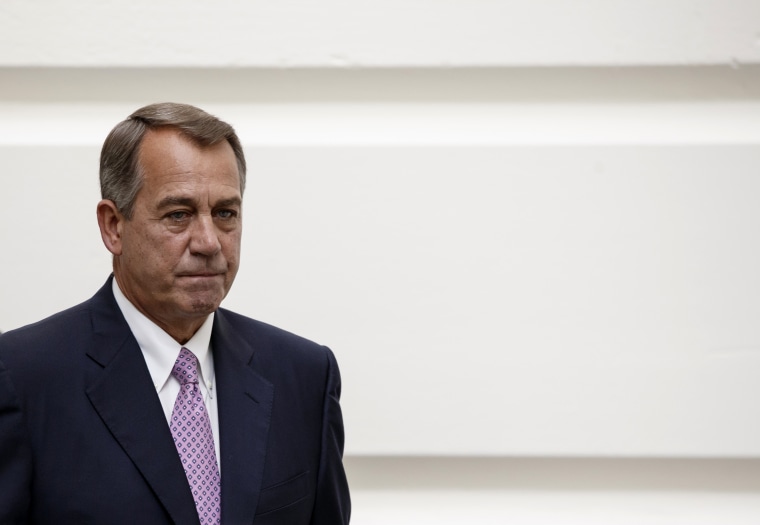John Boehner raised the specter of a first-ever federal default Sunday morning, telling ABC's This Week that if President Obama doesn't come to the table with congressional Republicans, default is "the path we're on."
"We are not going to pass a clean debt limit. The votes are not there in the House," the Republican House Speaker said. "The president is risking default."
The looming debt ceiling is set to reach its limit October 17. The White House has warned that a debt default would be devastating to the country.
Now on day six of a government shutdown, Boehner repeated that he wouldn't bring a clean government spending bill to the floor. "There are not the votes in the House to pass a clean CR," he insisted.
White House officials quickly latched onto Boehner's claim, taunting him to hold a vote.
"The Speaker says there are "not enough votes" to pass a clean CR? If he's right, why not prove it?" tweeted White House press secretary Jay Carney.
"If there are not votes to open the government as Speaker Boehner says, why is so afraid to call the vote and prove it?" wondered senior adviser Dan Pfeiffer.
A number of House Republicans have signaled their willingness to vote for a clean spending bill in order to end the shutdown. Based on an independent analysis by the NBC News Hill team, as many as 22 House Republicans have indicated they would support a clean CR. That means if all 200 Democrats voted in favor, it could pass.
Boehner justified using the debt limit to force legislative change, saying it was commonly done throughout U.S. history.
"Every president in modern history has negotiated over the debt limit," Boehner told ABC's George Stephanopoulos. "Debt limits have been used to force big policy changes in Washington. And guess what George -- they’re going to be used again."
His comments seemed to contradict recent reports that he would not let the country default, and would break the so-called Hastert Rule in order to avoid breaching the debt ceiling.
Boehner also argued that he was not pressured by his party's more conservative wing to link Obamacare defunding with government funding against his will.
"You've never seen a more dedicated group of people who are thoroughly concerned about the future of our country," he said of the House GOP. "It is time for us to stand and fight."
On CNN's State of the Union, Texas Republican Sen. Ted Cruz continued to argue that Obamacare should be used as a bargaining chip in negotiations to raise the debt ceiling,
"The debt ceiling historically has been among the best leverage that Congress has to rein in the executive branch," said Cruz, who also placed blame squarely on Obama for not being willing to negotiate.
On the debt ceiling, Cruz said any agreement had to be three-pronged: significantly reduce government spending, avoid any new taxes and "mitigate the harms from Obamacare."
"What the American people want is to open the government and stop the harms from Obamacare," Cruz said.
On Meet the Press, Rand Paul again blamed the White House and Democrats for the shutdown, insisting that it is the president who is being unfair by refusing to change a law that has been signed, upheld by the Supreme Court, and partially implemented.
The more than 40 attempts to defund Obamacare were not sour grapes, according to Paul, but rather a congressional duty. Congress “is not obligated once something is law to never change it,” he said.
Paul avoided discussing the Republican strategy surrounding debt ceiling negotiations, even questioning whether the U.S. would really default and suggesting that the government brings in enough tax revenue to pay interest on debt.
"I think it's irresponsible of the president and his men to even talk about default,” he said. “There’s no reason for us to default.”
Treasury Secretary Jack Lew took to Sunday’s morning shows to sound the alarm for the White House.
On NBC's Meet the Press, Lew explained that the U.S. hit the debt limit in May, and that he has already exhausted all of the “extraordinary measures” at his disposal to fulfill fiscal obligations.
